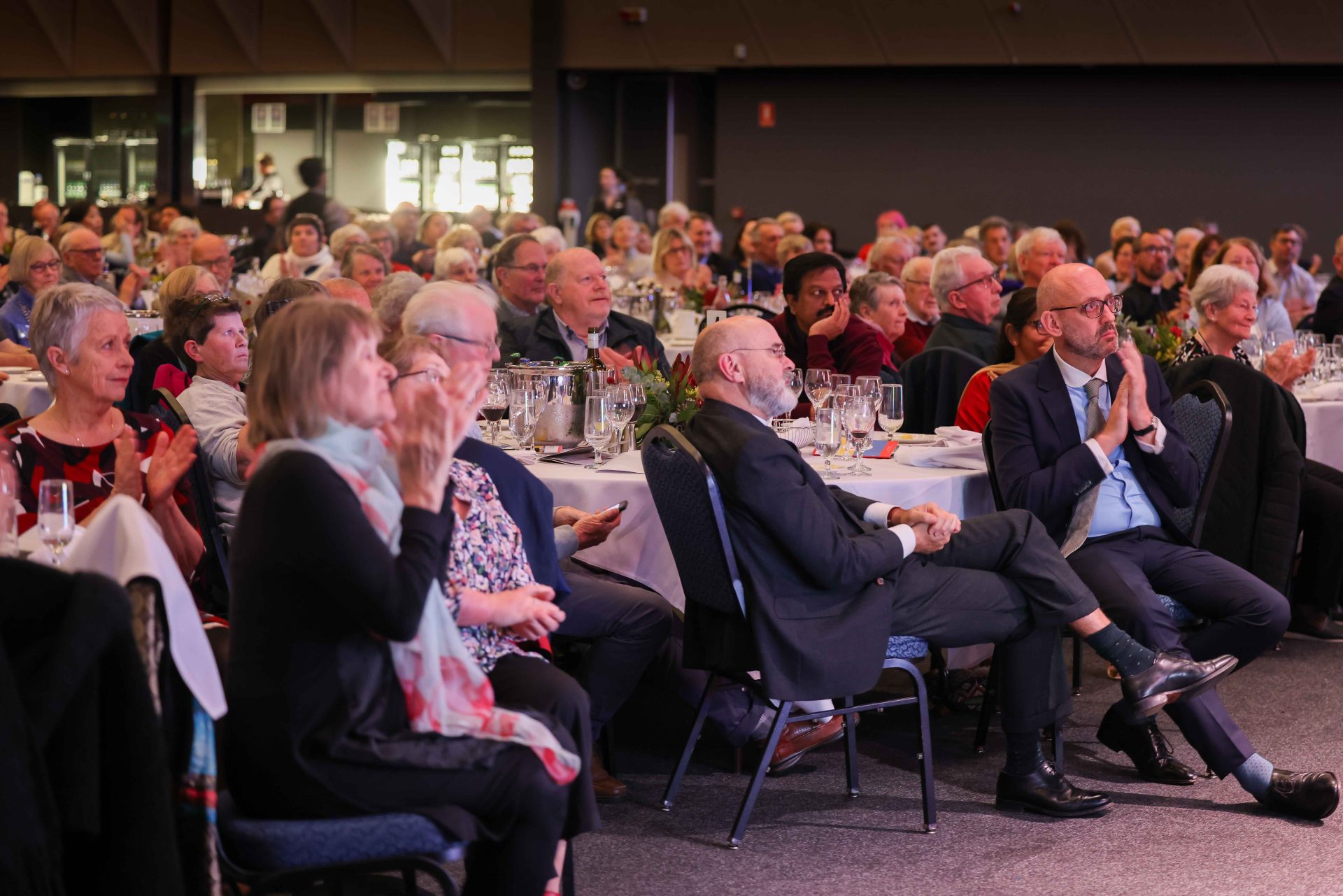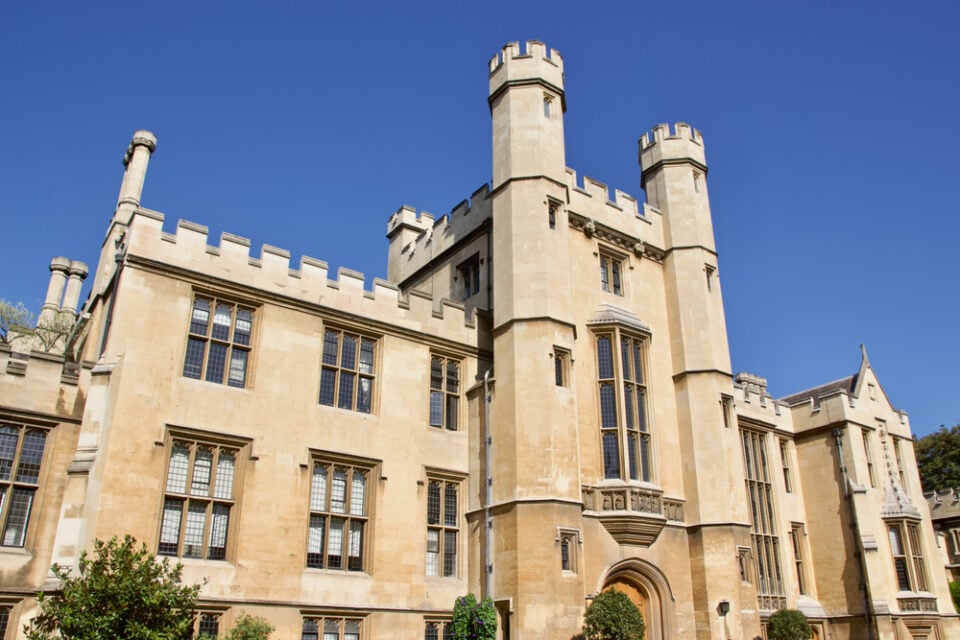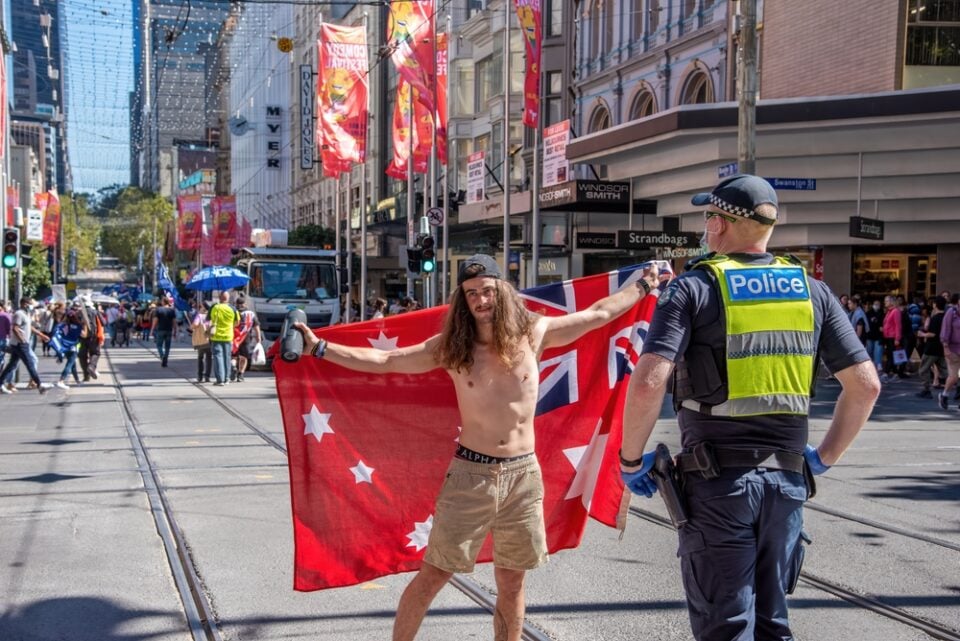God calls our diocese today to continue with the radical imagination that drove our first bishop, says Archbishop of Canterbury
The following is the text of the speech given by the Archbishop of Canterbury, Justine Welby, at the dinner to mark the 175th anniversary of the establishment of the Diocese of Adelaide.
It’s a great honour to be here and extraordinary that so many people should be here this evening, and thank you very, very much. Congratulations to the 175 years of work that you have been doing, it’s absolutely… When you think what it was like when people came here, it’s extraordinary. I’ve been much moved by the openings of everything I’ve gone to over the last few days, both in West Australia and here. Therefore, would echo my acknowledgement that we are on Kaurna land and the recognition and attribution to the elders past, present and emerging. Particularly, many happy returns to Bishop Chris. I hope and pray that the ministry that he exercises in the work of Bishop for indigenous people, for Aboriginal people and Torres Strait Islanders will continue to flourish and to develop, and be given higher and higher priority in this country.
Because it’s obviously one of the great things that around the world we’re learning, and it’s very, very important indeed. Your first bishop, 175 years ago at the same time as the state was founded, Augustus Short, was a man of remarkable vision, extraordinary vision. He saw the vision of a country that he couldn’t possibly have imagined, because there wouldn’t have been the pictures. there wouldn’t have been the ways of finding out about it. But he sensed the call of God, and he may have been short by name but he was not short by imagination, in contrast to the current Archbishop of Canterbury. In 2016, on the centenary of the first day of the Somme, the Battle of the Somme in France, I was asked to go to France and do a prayer at the centenary. We stayed the previous night in a little village not far away, and in the morning, as we were setting off. We were going out of the hotel and a voice across the hotel said to someone they were standing next to but a bit loudly and we heard, “Isn’t that the Archbishop Canterbury?”
The other bloke said, “No, too short,” so I’m really sorry if I disappointed you. If we go back to that time in Adelaide in 1914, 108 years ago, early in July, they probably have had a report that said that an obscure Austro-Hungarian prince had been shot dead in Serbia or what’s now Serbia. I very much doubt that an equivalent gathering then would’ve thought much about it. Yet, that event was triggering what in over the next four years would kill tens of thousands of Australians, and tens of millions of their fellow human beings around the world, that would destroy three empires and cripple two more. We don’t know what the future will bring, any more than Augustus’s Short could then have imagined now. So, the question in each generation for the church and for society, but I believe the church has to be the path finder for society, is not as was quite rightly said earlier, looking in the rear view mirror, though that’s important. But it’s looking forward and it’s looking around, it’s understanding our context, understanding our history and understanding our future.
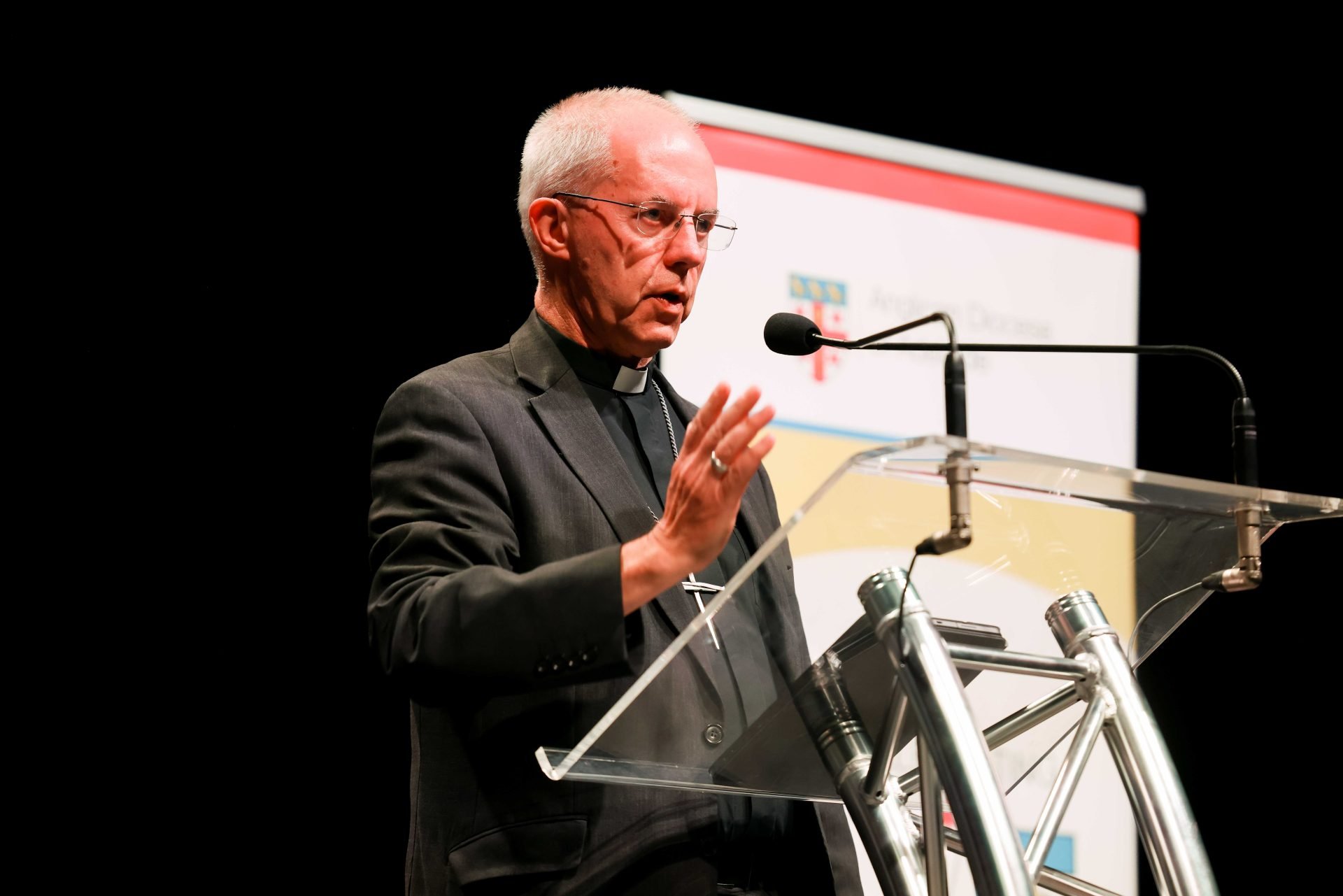
The political philosopher, Edmund Burke said, in his essay on the French Revolution in 1792, that the social contract is a covenant between those who have lived in the past, those who live today, and those who are yet to be born. It’s an extraordinarily powerful statement, it’s one that perhaps with the understanding of the land that the Aboriginal peoples of this land and the Torres Strait Islanders would understand very well. Our
covenant with the past, our covenant with those around and our covenant with those yet to be born. When we look around, it is easy to be depressed and scandalised among the day to day problems, 52 wars around the world, including Ukraine, Russia. The economic crisis that is afflicting so many countries, with whole swathes of Africa now registering as in imminent danger of the most severe famine for decades because of the cutting off of grain and the rapid inflation in energy prices. With food bank use in the UK quadrupling in the last year, even when there’s no unemployment, we have the lowest unemployment we’ve had in 45 years.
With pressure on society, most of all, as you’ve seen in Australia, in Melbourne in the last few days, pressures on our societies in the secularising countries of how to deal with truths that conflict in that case. I’m not going to go into detail or comment on that, but it seems to me to be a wider importance. But in that case, in Melbourne, the truth that homophobic behaviour is entirely wrong, and the truth that freedom of religion and belief is an essential part of any civilised society. The list of things that we can worry about are endless, the context in which we’re living is threatening. President Zelenskyy in Ukraine said in a BBC interview yesterday, talked of Russia’s potential use of nuclear bombs, tactical nuclear weapons, and the consequences of their use would be dramatic and extreme. It may be very far from here, but we all know here from the experience of two world wars that what happens on the other side of the world today can be very much a reality here tomorrow.
But it’s not a case for fear, because at the heart of what we do as Christians, and I’m assuming that one of the reasons you are here is either you belong to a church or you at least have some contact with someone that does. So, please forgive me if I’m making assumptions about faith, I’m not, I’m just talking generally. But for Christians of all churches, the heart of what we have to do is to be aware of the world around, to be aware of our history, the 175 years and what it has produced. To be aware of where God is needing us in the future, because that the heart of faith is not a series of rules about good behaviour, is not a moral code, although they’re both of huge importance. But is a relationship with God who raised Jesus Christ from the dead, who lived as a human being, died on a cross, was raised from the dead, ascended to Heaven, and sends the Holy Spirit of God to be with us today, to give us wisdom, direction and strength.
Whether you are the average Anglican, which is a woman in her thirties on less than $4 a day, living quite likely in Sub-Saharan Africa, quite likely a 50/50 chance in a zone of warfare, immediate post-warfare or persecution or a combination. Whoever you are, you and I are called to live in today’s world. Not to circle the wagons and try and exclude the world, but to live in today’s world and engage with it at every level. So, the first point, and that’s about the first half of what I want to say is let us be realistic about the world. Over the last 40 years, all the great faiths of the world, including Christianity, have seen a sharp rise in fundamentalist extremism. Fundamentalism usually leads to a slightly sectarian approach which says, “Only we have the truth.” The next stage is where people say, “Only we have the truth, and God has made it our job to do his work of making sure everyone knows and believes and has the truth that we have imposed on them.”
Our job is to get out there and change things. Our job is to have the imagination to say, ‘God can change things, we just have to go with him and do what he tells us to’.
The church has done that over the centuries millions of times, and invariably, with disastrous effects. Jesus did the opposite, when he was alive he was funny, most of the parables have a joke in them, we’re so serious when we read them. Think of the parable of the good shepherd who goes to find the sheep, shepherds were notoriously scummy people, bit of a, in your language, mob. They’d sit around, they carried knives, because it was a dangerous job and they weren’t afraid to use them. People told shepherd jokes in those days, like they used to tell, I don’t know whatever you told in Australia. But in England we used to tell Irish jokes, in France they told Belgian jokes, and in Switzerland, they told French jokes.
So, when Jesus says there was this [shepherd, everyone thought this is going to be a good one.. There was this shepherd and he had 100 sheep, and he lost one, typical shepherd. So, he left the 99 alone in the wilderness and went to find the one, stupid man, typical shepherd, leave 99 sheep. Then Jesus says, “God’s like that, God’s like that,” and they all go… The church, his job, is to live in a way that makes no sense if God does not exist, I’m quoting someone there. I’m not that clever, but that is our job. So, in a world where fear and insecurity are so easily able to overwhelm us and cause us, as has happened in every major faith over the last 40 years, it’s a sociological, not a theological thing, for in each faith groups of extremists together who want to keep the world out and keep themselves pure.
That is not our job, our job is to get out there and change things. Our job is to have the imagination to say, “God can change things, we just have to go with him and do what he tells us to,” take Anglicare, I had three visits today, one to a parish, and one to a place looking after people who come out the care system, and one to a place that looks after people who’ve been homeless, sleeping rough, and gives them a home and loves them and cares for them. That is looking around, trusting God, and changing lives, one at a time. The parish had built a community garden, and it’s amazing, a stroke of imagination from the people there when they were doing some mission action planning.
Incredible gift to the spirit, they change things and people start coming along, because they see a church that has activity. It doesn’t have to be huge, I just has to be committed to being available to God, which in biblical language is called holiness. Holiness isn’t about being pure and never looking twice in the wrong direction. Holiness is about saying to God, as Isaiah did, “Here am I, send me. Here are we, send us,” that’s what the diocese has done at its best over 175 years. When it’s confident about its message, confident about its mission, confident about its God, we don’t have to be confident about the future. It’s above our pay grade, that’s God’s job. Leave it to him, he’s been doing it for a while and he’s pretty good at it.
So, that’s really what I want to say to you in the short time this evening, God called this diocese into being through putting a seed of imagination into Bishop or Augustus Short’s mind and those with him. God calls this diocese today in our present world to continue with that radical imagination that says, “We need not worry about the future, but we will tackle the present, lay and ordained, everyone from the youngest to the oldest, because God has a call and a mission for everyone without any exception.” God will cause this diocese to be filled with ever greater life when we are open to his call, faithful in our action, and obedient in our hearts. But for that to happen, we have to draw close to God every person, to the God who doesn’t say to us, “When you are good enough, you can get close to me.”
But to the God who says, “I am closer to you than the beating of your heart, I love you more than the person who knows you best and loves you most, and I know you better than them, and I love you more than them, believe it or not.” Who says, “I call you to more excitement, adventure, fear, drama, imagination, then in your wildest thinking you could begin to have.” A diocese or a church that gets hold of that, or an individual, will change the world. The church around the world, the churches that do that, and I’ve seen some. The churches that do that, even in very secular societies, will find themselves with a number of problems. How do we get everyone in because we haven’t got enough room? How do we cope with the abuse that it generates? Because Jesus says, “That’s part of the job ticket,” and how do we give adequate thanks to God for the wonderful things he’s doing among us as he’s doing among you? Thank you.
‘Justin and Lynn’, on the couch
The Archbishop share some thought in conversation with the Rev’d Lynn Arnold
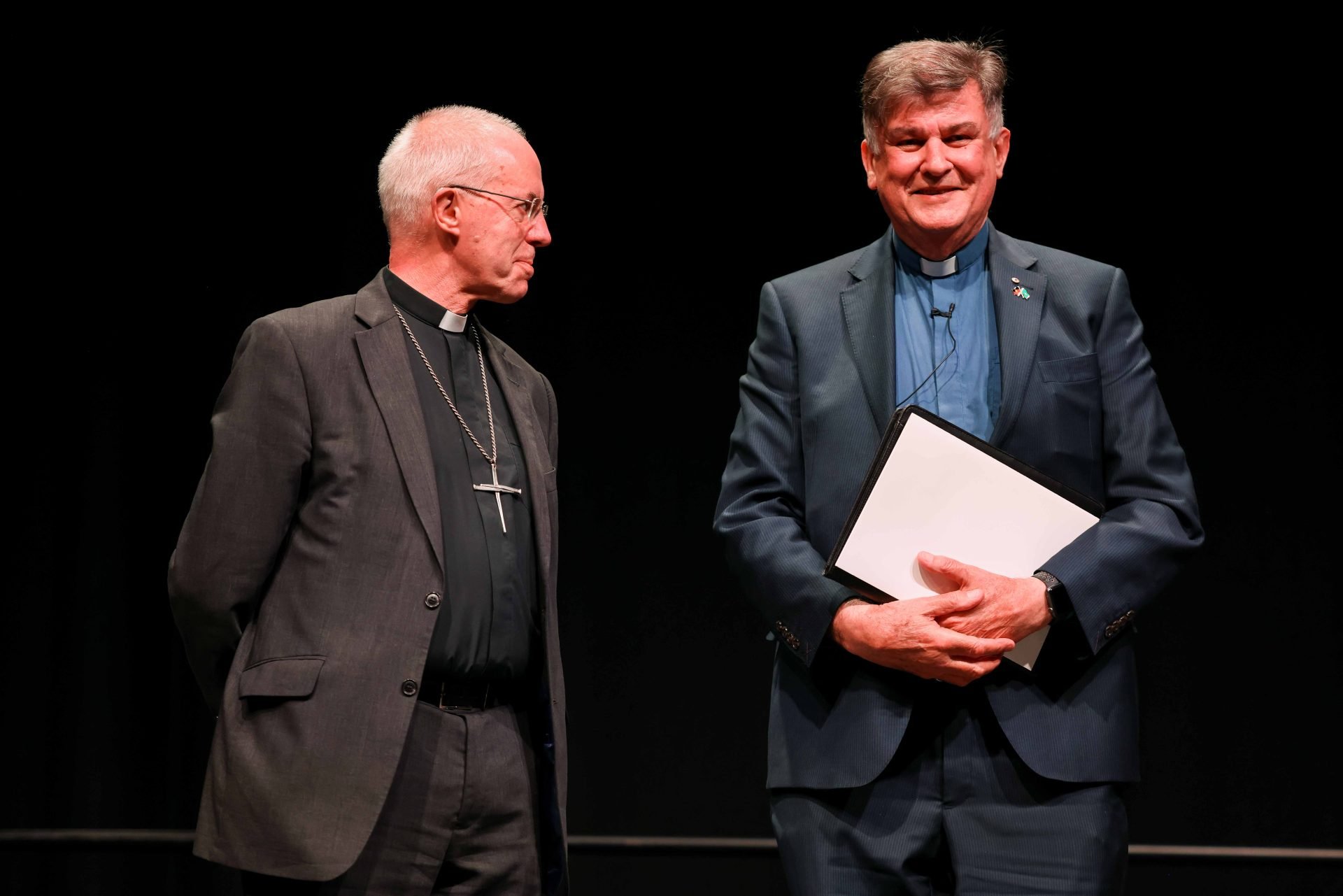
Lynn Arnold
We acknowledge the Kaurna people and their spiritual relationship with the land, as the tradition custodians of the Adelaide region. Well, it is a very great pleasure for me to be here tonight, Your Grace, to be in conversation with you. I’ve got this folder here to sort of remind me maybe this a bit like This is Your Life or something that’s about to happen. A surprise-
Archbishop of Canterbury
Yeah, it’s feeling a bit that way. It’s a great honour to be alongside you, Your Excellency. I’m Justin and you’re Lynn.
Lynn Arnold
Ha! Love it.
Now, you are the, by the way, Archbishop Geoffrey did a lot of homework as to what the 175th is. I thought simply the 175th was a party, which we’re having a great party tonight. But you are the centesimus quintus Archbishop of Canterbury.
Archbishop of Canterbury
Indeed.
Lynn Arnold
Hundred and fifth. In your wonderful address just now, you spoke about a call and a mission for everyone. Now, can I turn that on you as to in your life is the call and the mission to you. I’m reading your biography on that. I found two interesting things. One is that-
Archbishop of Canterbury
That’s one more than even I found.
Lynn Arnold
You became a Christian at university, a time when many others are questioning their faith rather than coming to it. Secondly, after graduating, you worked successfully in the corporate world and despite the road ahead looking very rewarding, you opted out and started on the road to ordination. What was the call and a mission that you were hearing in both of those phases?
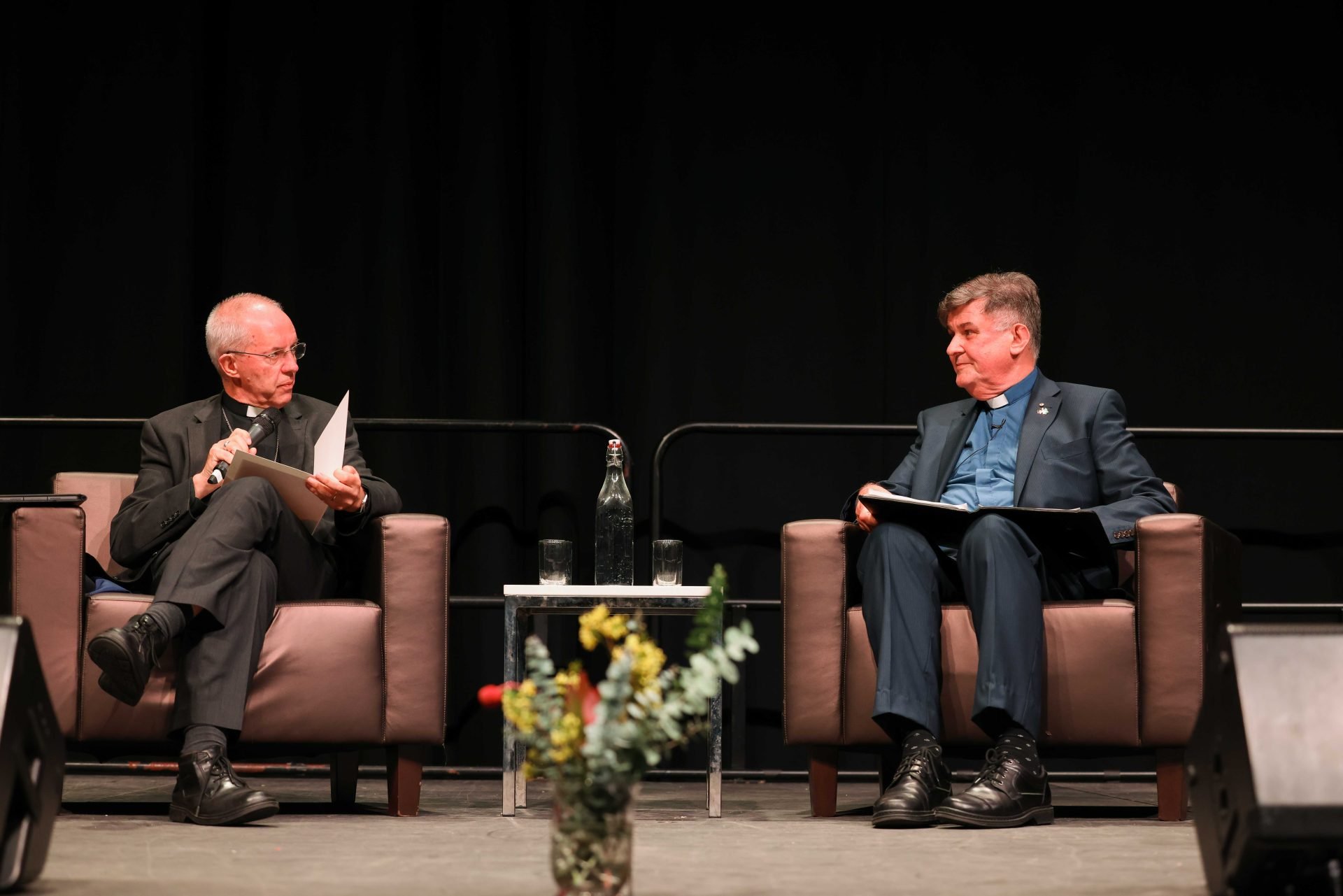
Archbishop of Canterbury
At university, I tried to learn to give short answers, but I’m usually bad at it. But at university, the call was a friend who took me along to a sermon in a church on a Sunday evening and which was about the key elements of Christian faith, about the kind of things I was talking about. And it was incredibly boring. I can’t remember a thing about it. And afterwards, we came out and he said, “What did you think about that?”
And I said, “Well… Very interesting.” And he said, “No, it wasn’t, it was really boring.” And we went to a restaurant, a cheap restaurant with students in Cambridge and talked and talked and talked. Then we went back to his rooms and he explained what Jesus had done for me. Living, dying on the cross, rising from the dead and what that meant for my life.
And it’s the first time. I go to church, a school chapel, I was at boarding school, a school chapel twice a day every day of term for 10 years. We were kind of submarine Christians in the family for a while because my parents were divorced and I was living with my dad. And when I say submarine Christians, I mean we surfaced once a year on Christmas Day. And then, we came to the surface to talk about God. But I’d gone through in chapel and the only interesting thing that happened in 10 years was the headmaster fell out of the pulpit.
But he explained it and I’d been between school and university working in Kenya and I’d found people for who with no money, with nothing, for who Jesus was a real person, not just the historical figure. And he explained it and late that evening, very late, just before next day as it were, he said, “So what you want to do about this?”
And he expected me to say, “I’ll think about it.” And I just felt, I didn’t even know if it was true. I said “Let’s pray.” I prayed and I said, “God, I don’t even know if you exist. But if you do, I want you to be in charge by life.” And something changed. And the being terrific up and down, something changed.
Second one, shorter answer. We were at church one evening, a big church in West London and there was bloke there who was preaching, who’d been offered a job after he’d graduated in engineering in the States. He’d been offered a job in NASA at a time when the moon program was running, so very exciting. And he’d felt that God had called him to ministry. And it’s one of the very few times that I’ve had a very clear sense of what I want to do from God. Because normally, it sort of emerges.
But as he said that, I sensed that I want to put it without sounding sort of hotline to God is your superpower. But I sensed God saying, “That’s what I want you to do.” I talked to Caroline on the way home and we spent a couple of… We went through the process. The first bishop I saw said, “I’ve interviewed more than a thousand potential candidates for ordination in my life and you don’t come in the top thousand.” And went on to say, “I can assure you, you have no future in the Church of England.” He has been proved entirely right.
I think actually he should have said, “I think the Church of England has no future with you in it.” But somehow, I ended up getting through the system and-
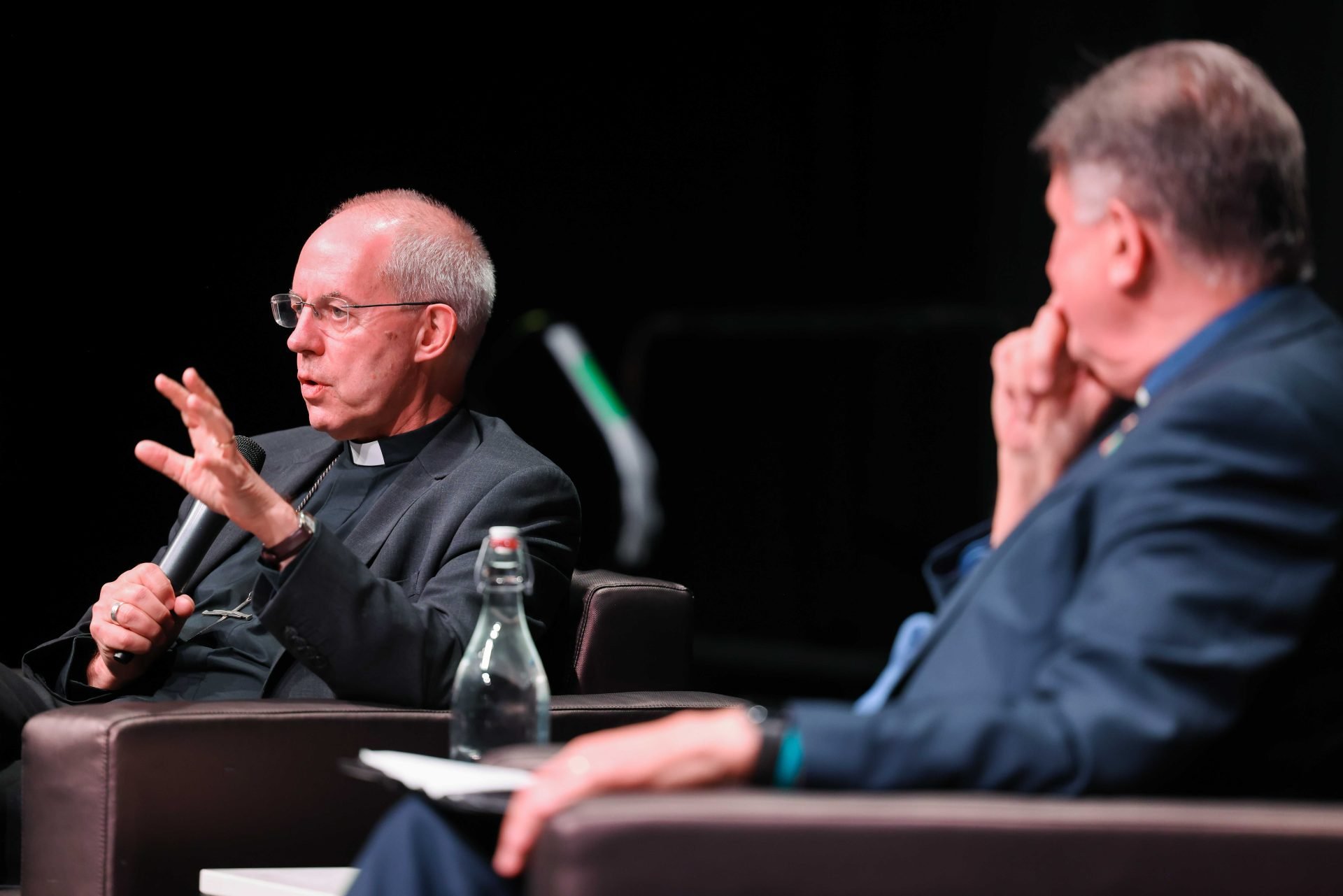
Lynn Arnold
Well, thank you, that’s-
Archbishop of Canterbury
…kicking and screaming.
Lynn Arnold
I wonder if that particular bishop is now the bishop of the outer Orkneys or something.
Archbishop of Canterbury
No, exactly. He did die. It wasn’t anything to do with me.
Lynn Arnold
Something in just now and in your address, you’ve actually commented on, on Jesus, the living Jesus, to in history related to you, then related to us. At your Easter sermon this year, you said, “Our greatest challenge is to live in a world where this new reality, Christ risen, is our central most determining reality.” And you went on the say, “Now, that means to live in a way that seeks justice, that values the vulnerable, that struggles for justice.” How do you see the Christian understanding of justice competing or latching with the world’s sense of justice?
Archbishop of Canterbury
I think first that the Christian sense of justice is based on, is fundamentally found in the action of God that completely intermingles justice and mercy because at the heart of our understanding of the cross, and there are lots of different ways of looking exactly how the cross works. But at the heart of it is that God is so just that he cannot overlook sin, but he is so loving that he cannot ignore the desperate need of a sinner to find love, forgiveness, hope of those. And that God through His own becoming human enables that extraordinary thing as it says in one of the Psalms that love and justice have met.
That is the ideal. It’s of judgment that is infallible and mercy that is unending. Mercy through love. Now, the world system of justice can aim for that, but with human fallibility it won’t work. And I think there are two ways in which it particularly fails. First of all, when the issue is retribution, not reconciliation. Vengeance, in other words. It’s simply a substitute for personal vengeance, which in many ways is why you have courts and stuff in historic terms.
And secondly, when justice is partial or belonging to one group or another, and I mean with your political background, you will know that just government is almost unachievable because you don’t have infinite resources. And one of, I will guess when you were premier, one of the hardest things to work out was what you’re going to do and rather what you’re not going to do that you want to do.
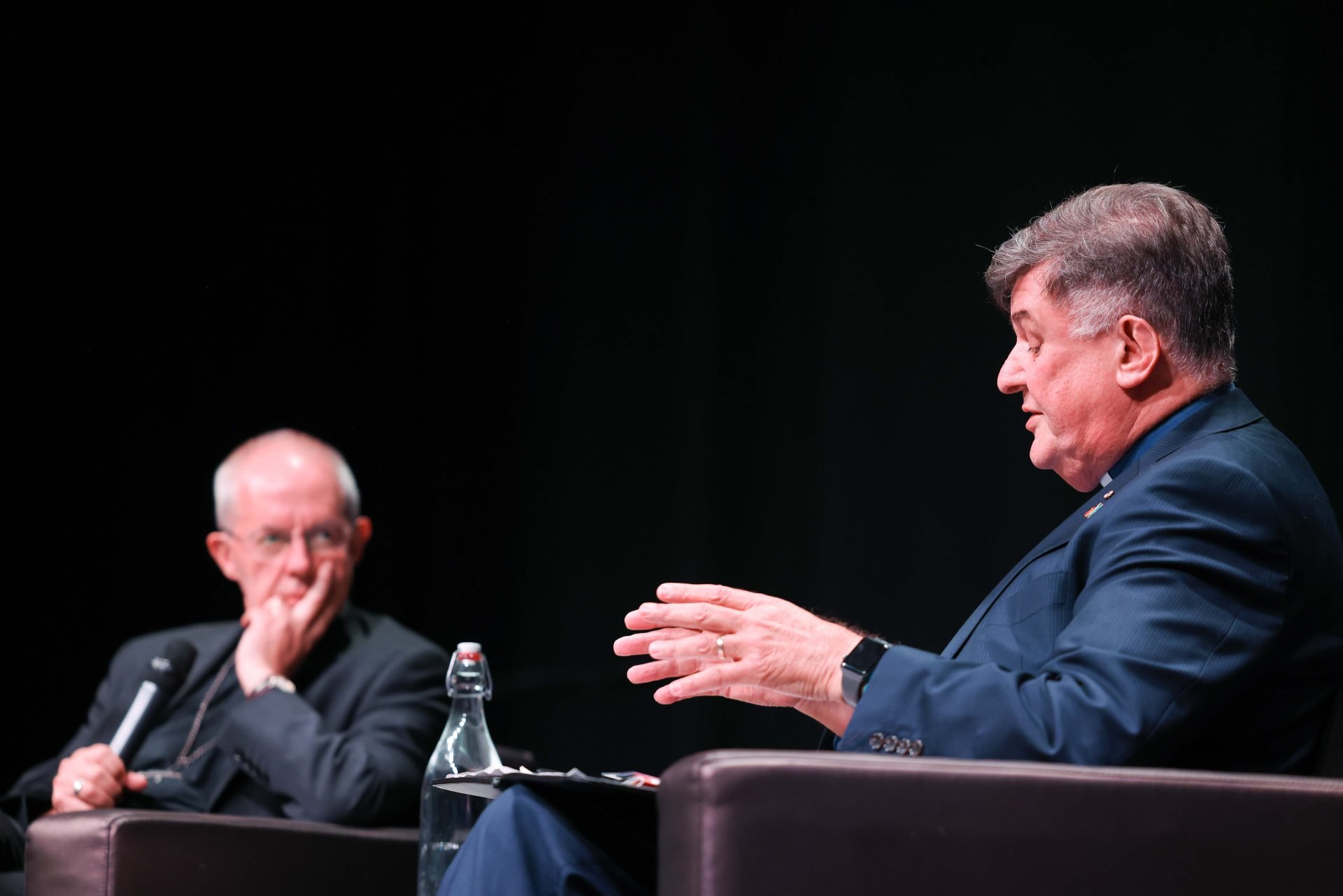
Lynn Arnold
Mm-hmm. Those people remember that when I was premier, we had remarkably lack of resources because of a certain economic collapse, but anyway.
Archbishop of Canterbury
That’s what it is. Yeah. But that’s the key point, isn’t it? Do you then think that given the reality of lack of resources, which is true for so many places around the world at all time, and for every government at some point, how do you decide what you’re going to spend those resources on? Mrs. Thatcher, when prime minister, famously said on a number of occasions when a policy was put to her, “Will it help our people?”
And I’m not making a particular political point, I don’t belong to political party, but what I would say is that’s not God’s justice. He, God doesn’t say, “Will it help my people, our people?” God says, “Is this for the good of the world? Is this for the common good?” That’s where I think you find the tensions but also the idea.
Lynn Arnold
Now you mentioned in the context of that, that the church has to engage with the world. You used the phrase in address, “We shouldn’t be circling the wagons and locking ourselves inside, separate from the world.” And I know from observation of Googling that you have very often made comments into the public square, the face of the public square. But that public square is becoming a highly polarised one. And just today, according to the Weekend Australian, about just how polarised our society is. And you said, “We have not found a way of disagreeing without exclusion, without canceling the people.”
How should we be addressing this issue of a world which seems to want to build barriers and walls and exclude?
Archbishop of Canterbury
One of the key things that Saint Paul says writing to the Ephesians is that Jesus broke down the barriers that divide us, talking in that particular context between Jews and Gentiles. The vision of the New Testament that you find of the church that you find for example in John 17 in Jesus’s prayer is of not everyone alike but everyone alight with love for one another. And that vision must lead the church into action in the world, that there’s no such thing as a non-political church.
Anglicare is a deeply political statement. Anglicare’s political statement is not pro-liberal or pro-labor or anything else. Anglicare’s political statement is that in a good society we should care for those who have no one to care for. We should help people who need help. That’s a profoundly political statement, as you know better than I do. And therefore, the church is always political. But it must not operate on the same political spectrum as politics and it’s not a criticism of politics. It must operate on God’s vision for a good society and seeking its example to demonstrate what that means at the local level. For instance, caring for people leaving the care system [inaudible 00:14:45].
And I think speaking without judgmentalism about where there has to be change. One of the things when I do speak, I do speak on politics, A, I never use names because I don’t attack individuals but ideas or policies, I’m very certain of that. And secondly, I’m making it clear that being in government as a politician is one of the hardest things in the world. I think it’s one of the most difficult things you can ever do. And so, that one of the things I always say is, “Pray for governments,” as I pray for Liz Truss, for Boris Johnson, but we’re getting quite astray and we’ll have to change our prime ministers, but… Did I say that aloud?
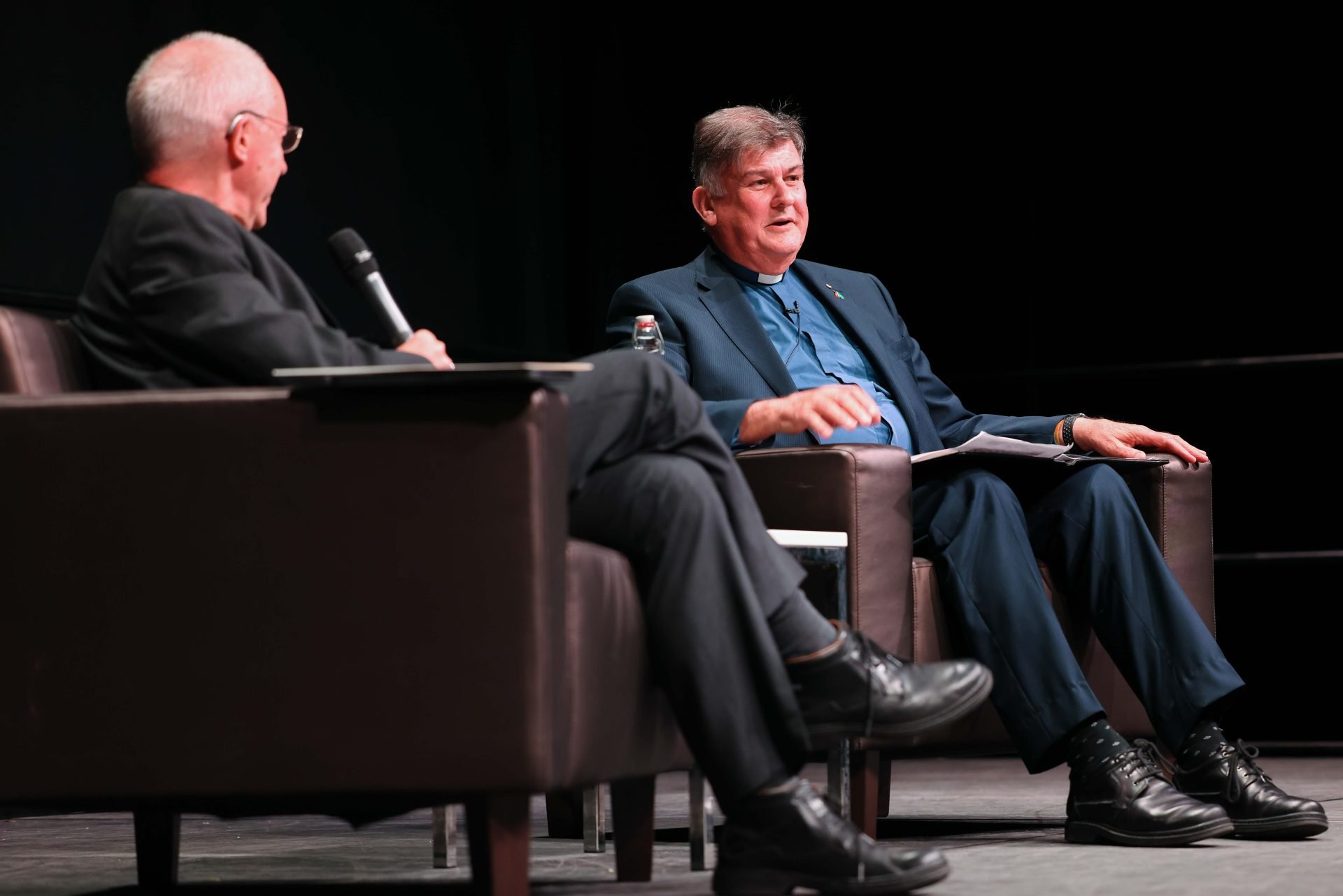
Lynn Arnold
Yes. Very right.
Archbishop of Canterbury
But to pray. Because you are doing an impossible job. You can’t… Politicians need all the support they can get. I don’t judge or hate politicians. But the political implications of something like The Magnificat, “Throw down the mighty from their seats, lift up the humble and meek.” If there was ever political statement it’s that one.
Lynn Arnold
Sure, that’s right. Now, you mentioned also in this context and how the church can play a very significant role. You used the phrase, “The church has to be the pathfinder for society.” Now, this year you’ve had the first Lambeth Conference for 14 years and the theme of that was God’s church for God’s world. Walking, listening and witnessing together. And I saw the word walking, I was wondering if you did do The Lambeth Walk, but nevertheless.
And at the end of the conference you said, “It’s been a very remarkable time and to be honest, has succeeded all the hopes I had.” And I must say that those of the archbishop and the bishops who came from here came back really enthused with what happened there. But what would you say to us? How should we as diocese, as parishes, as individual Christians, how should we be responding to what came out those Lambeth discussions?
Archbishop of Canterbury
I’m afraid I’m going to quote someone else but he’s quite a good quote, which is, Jesus. “Wash feet, love one another, love your enemies, love your neighbour.” And if you can find someone who’s not in any of those categories, you’re doing better than I. That’s the first four things and that’s done by God, the Father.
And love in the Bible is not an emotion, it is emotion expressed in action. It’s a desire for the wellbeing of the other without expectation of return for oneself. That’s the Christian revolution. I don’t get anywhere near it. But just an incidental anecdote, I was preaching in Bristol about eight years ago and I said something like that. I said from the pulpit, it was a full church and I said from the pulpit, “We’re all sinners, you’re sinners and I’m a sinner.” And one came out to me afterwards and said, “If I’d known you were a sinner, I wouldn’t have come.” But anyway…
But that’s the revolution, that’s the pathfinding. Love in action is what we’re called to. And that means that not only do we do, but through our words we encourage others and our press to do, to come alongside and work with us. And sometimes we partner with people that have no sympathy with the faith yet. But when they see the love we have for one another, which is why unity not unanimity, unity is so important.
When they see the love we have for one another, they begin to find themselves drawn as I was drawn by that friend to ask themselves, “Can this love of God, this something that can reach even me?”
Lynn Arnold
Unity but not unanimity.
Archbishop of Canterbury
Yeah.
Lynn Arnold
It’s a very powerful way of putting it. We have a little on time here and so, I’m going to have to leave out some of the other questions I have.
Archbishop of Canterbury
It’s the great thing about these things. Just keep talking and you’ll skip all the difficult ones.
Lynn Arnold
Well, what you did tell me again, your address tonight is the list of things we can worry about are endless. And I guess that’s something of the daunting thing we all feel, oh there’s just too much to get a handle on. Too much to worry about what can I do as a single little participant of that? Now, would you like to share with us a couple of keynote ones, a couple of main issues that you’d like to draw our attention to or have us leave tonight with these rumbling around in our mind about well, what am I going to think about this, what am I going to do about this?
Archbishop of Canterbury
Yes, I would, but I have to think for a moment. A general point, we can only, I know this is going to sound very banal, but that’s part my job. We can only do what we can do. Sorry, anecdote and then answer because another rule of being an Archbishop of Canterbury is you talk what you are thinking, what you need to say.
Lynn Arnold
I remember doing that as a politician.
Archbishop of Canterbury
Some advantages. A friend of mine, an amazing friend of mine called to Désiré Mukanirwa, who I first met when he was parish priest in Goma which is a town in Eastern Congo area. You’ve been there, as you know how poor it is and desperate. And I won’t go through all that but I was visiting him on one occasion. It was under siege from militias, they were about five kilometres outside the town and we had got some refugees in and we’re trying to feed them, that kind of stuff.
Went to a local refugee camp which had about 25,000 people there and was just the most desperate conditions you can imagine. And on the way back I said to him, “Desiree, how do you cope with this?” And he said, “I do what God gives me the resources to do and the rest is His part.”
I think that is one of the most profound things put so simply. And so, my answer to you is the indication of what God is calling you to do is what He gives you the resources to do. I mean sometimes we see a need and we pray for the resources. If they don’t come, don’t agonise, but see what you can do. That’s the first point.
Secondly, in terms of obvious things, the biggest thing we have to do is united prayer for the world to find afresh the truth and joy and love of Jesus Christ for those who around us. Second, everyone can do that. Second, things you are already doing, like recognising past sin in terms of indigenous people and seeking to do what is right. That is something that to one extent or another will affect most people. It’s conscious of where we’ve come from.
Third, there are so many things that come to our attention. We can’t stop the war in Ukraine and Russia, but we can pray for that. We can’t prevent people, the situation, we can’t ease the situation with Taiwan and China, but we can love those who the world does not consider worth value. We can love those who come from places like China or Taiwan and have arrived as either as visitors or as those immigrating into this extraordinary and marvellous country or who comes refugees and need our help.
I can’t really be that specific, but I can say from absolute certain experience, and you’re doing it already with the wonderful things like Anglicare, from which I’ve been learning a huge amount. From certain experience and do what God gives you the resources to do. That’s an indication of a call.
Lynn Arnold
Well, thank you. I think that’s a wonderful message on which to end our conversation tonight because I think that really says all for all of us. Justin, thank you so much for indeed for being a part of this conversation. It’s been a privilege for me to be a part of this and for all of us to be here sharing this time with you. And God bless you in your new ministry.
Archbishop of Canterbury
Thank you. But before we finish, thanks, I’d like to give you 50 trees.
Lynn Arnold
50 trees.
Archbishop of Canterbury
50 trees for the diocese. Actually, it’s a serious thing. We have planted 50, that we’ve purchased the planting of 50 trees and would like to give a certificate of donation of that-
Lynn Arnold
Great.
Archbishop of Canterbury
…as a sign of our common work around climate change. And that’s an example of using what resources we have to try and make it happen, so if I may present this to you on behalf of the diocese.
Thank you very much. Let me give you a very short last challenge. By this time tomorrow, someone asked me about it earlier, so I’m going to say if someone, where are we? Saturday. If someone said to you on Monday, someone you just met who was not a churchgoer, “What do you do over the weekend?” You say, “Oh, I went to this dinner and this late, middle-aged pong speaking to speaking about God and then went to church on Sunday morning, I had to do or evening.” And they say, “Church? Why? God, why?” I want you by tomorrow evening with someone else to be able to tell the other and listen to them telling you that in less than one minute without using any religious jargon at all why you’re a Christian. Good luck.
Lynn Arnold
Thank you very much.
